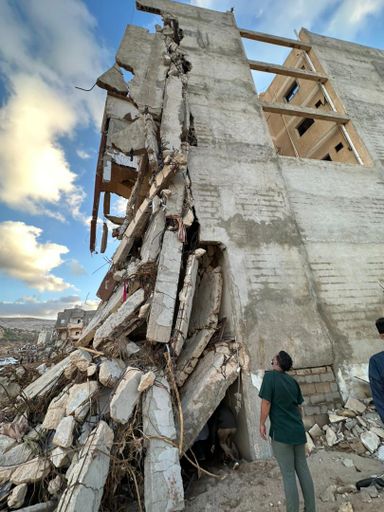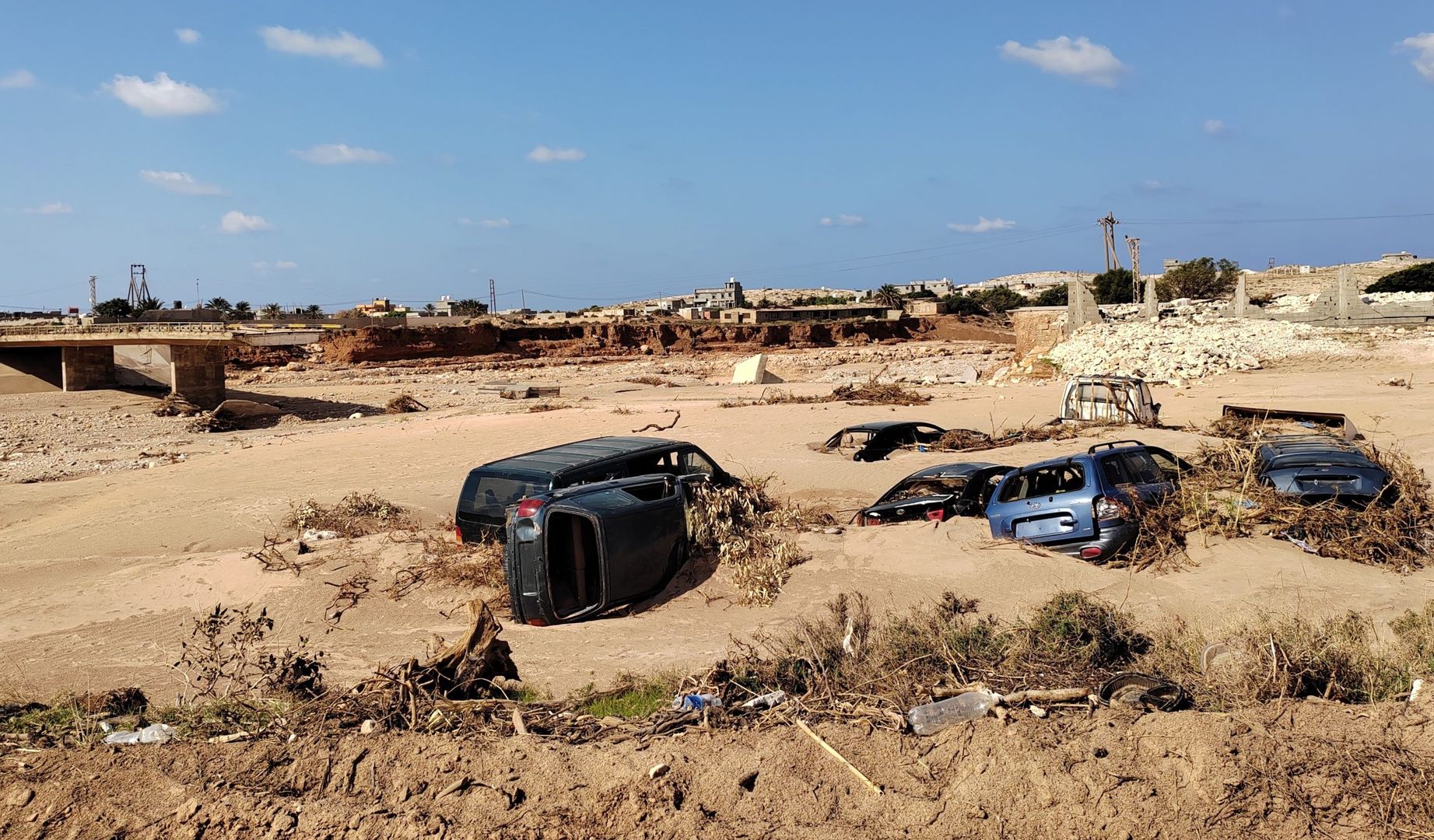UPDATED 19 SEPTEMBER
Storm Daniel made landfall in Libya on 10 September 2023 giving rise to severe flooding across Northeast Libya affecting multiple cities and towns, across 5 provinces, including Derna as well as Benghazi, Al-Jabal Al-Akhder, Al-Marj, Batah, Bayada, Albayda, Shahat and Sousse.
The storm caused high winds, torrential rainfall, and flash floods in the Derna area, prompting the government to declare a state of emergency.
In the city of Derna itself, heavy rainfall and floodwaters inundated two reservoirs causing the dams to burst and flood the city. Additionally, the river Derna (Wadi Derna) which runs through the town, burst its banks, washing away roads and buildings.
This has now resulted in the massive loss of life, as the death toll in Derna alone has reached almost 4,000 according to the UN, while 9,000 remain missing. Tragically, one of DanChurchAid’s colleagues in Derna lost 35 of her extended family during the floods.
The impact of the storm
Storm Daniel has destroyed houses and utility supplies, leaving many areas without any electrical power or water. The electricity outages mean that mobile phone masts do not work, leaving many incapable of communicating and hampering rescue efforts.
With fractured water supply pipes there is a lack of potable water.
Hundreds of houses have collapsed, and homes reduced to a messy pile of mud and debris – and many persons are buried under there as well. The shear geographical scale of the storm-affected areas and the degree of destruction has overwhelmed local and national authorities and response mechanisms.
Many roads have been washed away, which makes access difficult and for some towns little short of impossible. Five bridges in Derna have been reported damaged, thereby impacting access in and around the city.

Healthcare facilities, electricity networks, buildings, roads and telecommunication, have also been significantly damaged. More than 2,000 buildings have been exposed to damage in Derna with 30 percent of Derna centre reported to have disappeared. The city of Sousse is also reported to be particularly affected by damage, with most of the city being underwater.
Displacements and risks for humans
According to the International Organisation of Migration (IOM), some 40,000 people are estimated to be displaced, with actual figures thought to be higher. Of these, 30,000 are displaced in Derna.
Schools and hotels are being used as shelters. With new significant displacement patterns, the risk of exposure to mines and unexploded ordnances is also now also growing exponentially, as floodwaters have shifted landmines and UXOs to areas previously cleared of contamination.
Moreover, the threat of disease outbreak, which was already considered high prior to the recent flooding, has now increased and includes the threat of water-borne diseases. Some 300,000 children are now at risk of Cholera and malnutrition, according to Unicef.
Difficult to access
Power outages have affected most areas in the cities of Albayda, Shahat, and Al-Marj. In Derna only two of the seven entrances are clear and navigable and all three inner-city bridges were destroyed, making the city virtually inaccessible.
The only remaining southern road to Derna, the Dhahr al-Hamar Road has sustained damage with a possibility of collapse and cut off access to Derna. In Soussa and Shahat, major roads linking the cities have either been flooded or completely swept away.
Humanitarian needs
Some 300,000 people were already in need humanitarian assistance, prior to the recent catastrophic flooding.
DCA teams on the ground report that most of the immediate needs requiring priority response support are for search and rescue efforts (including ambulances, trauma and emergency surgical kits, first aid and psychosocial support, medical personnel, body bags, medicines for hospitals and health centres), and for support to internally displaced persons (IDPs).
Following this, the need to support IDPs will persist, as will rubble clearance efforts, cash support and rehabilitation of infrastructure and private property.
According to the UN, some 884,000 people need humanitarian assistance – an increase of almost 300% from before the storm.
DCA Presence in Libya
DanChurchAid (DCA) has been in Libya since 2011 and has permanent offices in Tripoli, Misrata, Sirte and Benghazi. All assistance to the Derna region flooding crisis is coordinated from Benghazi.
DCA staff in Tripoli, Misrata, Sirte and Benghazi are mobilised collectively to support their colleagues in Derna in their intensive efforts to support the affected communities.
DCA has also worked in Derna and engages closely with the municipal council of Derna and the communities of the region. DCA has partnered with the Libyan Red Crescent for several years to undertake mine risk education and psychosocial support.
What is DCA doing to help?
- Search & Rescue support: Currently, DCA has four staff members on the ground in Derna who are assisting search and rescue efforts and monitoring the situation. DCA’s team members based in Sirte travelled with partner Libyan Red Crescent into Derna and assisted in delivering their medical supplies to one of Derna’s main hospitals. In response to direct requests from the Local Municipal Council, DCA are providing support to Search and Rescue efforts through the provision of tools (torches, masks, helmets, body bags) and further shipment of supplies were brought to the city of Al Bayda in support of the Libyan Red Crescent.
- IDP Support: DCA are also providing support to IDPs in schools in Benghazi through the provision of NFI kits (blankets, dignity kits, toiletries, utensils etc). DCA teams are also continuing to provide psychosocial support to people in need through the Libyan Red Crescent.
- Mine Action: Following reports of mines and other unexploded ordinances being washed away, DCA also stands ready to provide mine risk education to mitigate against resulting casualties.
- CASH Assistance: In the longer-term, DCA is preparing to provide much-needed cash support for those affected by the flooding – including those whose livelihoods have been affected, as well as those whose homes were damaged or destroyed and who are displaced.
(DCA’s effort as of 19 September 2023)
What’s next?
During the emergency phase, the priority is to support the search and rescue teams and those who have been displaced. In follow-on phases DCA will look to provide psychosocial support, which we already deliver in Libya through the Libyan Red Crescent and other civil society organizations.
DCA Libya has significant experience with humanitarian demining and explosive ordnance clearance, as well as explosive ordnance risk education. Delivering risk education to the affected communities is very likely to feature in a future response phase, as the flooding is known to have moved and spread more widely sub-surface explosive items, including mines, from previous conflicts.
How can you support?
If you are in Denmark and wish to support DCA’s efforts in Libya in the aftermath of the storm Daniel, please go to our Danish website.
You can also donate through our ACT Alliance partner Christian Aid.


